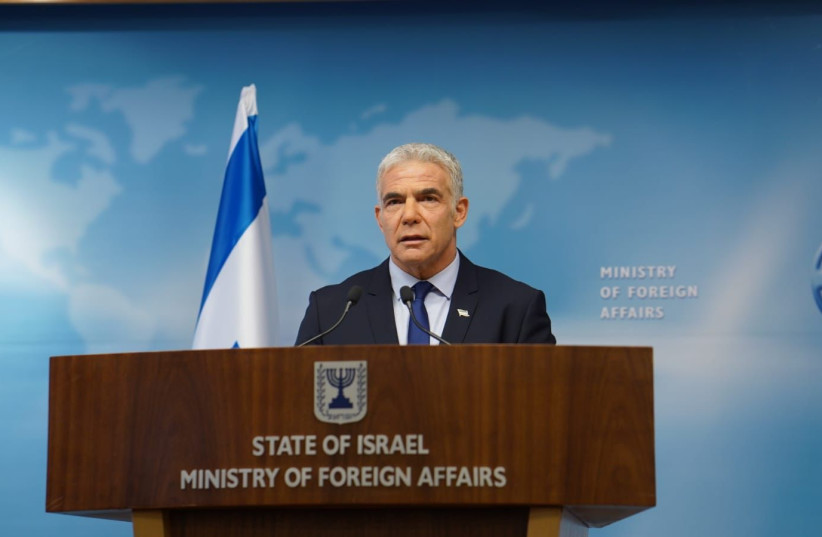Israel did not sign onto a United States-backed resolution condemning Russia's invasion of Ukraine that failed to gain United Nations Security Council approval on Friday night.
Nor has Israel clarified what its stance will be on an upcoming UN General Assembly resolution that is expected to take Russia to task for its military action in Ukraine.
Israel is not one of the 15 UNSC members and so could not vote on the resolution submitted by the US and Albania.
The US, however, had asked for its diplomatic allies that were non-UNSC member states to make good on an option to sign onto the text as a sign of support.
At least 49 states nations heeded that call. Diplomatic sources said that Israel had refrained from taking a stand on the UNSC resolution because Jerusalem knew that it had no chance of passing. With respect to the UNGA resolution, the source said that Israel was waiting to see the language of the resolution before solidifying its position.
"Our allies know exactly what our position is on the issue," a diplomatic source said.
Israel has attempted to take a moderate tone on the Russian-Ukrainian crisis. Foreign Minister Yair Lapid has condemned Russia, but Prime Minister Naftali Bennett has been careful to speak only of his support for the Ukrainian people.

Army Radio reported on Friday morning that US Secretary of State Antony Blinken had asked Israel to sign onto its UNSC resolution when he spoke with Lapid Thursday night.
The UNSC resolution in support of Ukraine garnered the support of 11 council members. This would have been enough for its approval, but Russia used its veto power and blocked the text's passage.
China, India and the United Arab Emirates abstained from the vote.
Russia is one of five countries — along with the US, China, France and Great Britain — which have veto power at the UNSC. Russia also holds the rotating UNSC presidency this month, which meant that its Ambassador Vasily Nebenzya chaired the meeting about condemnation of his country.
Nebenzya chastised those who sought his country's condemnation stating, "You have made Ukraine a pawn in your geopolitical game with no concern whatsoever about the interest of the Ukrainian people.
"Responsibility for what is transpiring at present lies not only with the Ukrainian government, but it also lies at your feet, ladies and gentlemen. And today's draft resolution, your draft resolution is nothing other than yet another brutal inhumane move in this Ukrainian chessboard.”
China's Ambassador Zhang Jun urged caution, "All actions should be truly conducive to defusing the crisis rather than adding fuel to fire" and warned against shutting "the door to a peaceful solution.”
Ukraine’s Ambassador Sergiy Kyslytsya said, “last night was the most horrific for Kiev since, just imagine, 1941 when it was attacked by Nazis.
"Last night was attacked by someone who pretends they are fighting with Neo-Nazism. Therefore, I'm not surprised as Russia voted against. Russia is keen on continuing its Nazi style course of action.”
US Ambassador to the UN Linda Thomas-Greenfield spoke to the media after the vote, flanked by ambassadors from many of the non-UNSC countries that had signed onto the text.
Thomas-Greenfield said it was important to take a stand against the aggression of one UN member state against the sovereignty of another.
"The UN Charter was written with the express purpose of preventing a war like the one [Russian] President [Vladimir] Putin just started," she said.
"President Putin chose to violate Ukraine’s sovereignty. President Putin chose to violate international law. President Putin chose to violate the UN Charter. President Putin chose to drop bombs on Kyiv, to force families to stuff their lives into backpacks and shelter in subway stations. President Putin is the aggressor here. There is no middle ground.
"Russia has abused its power today to veto our strong resolution. But Russia cannot veto our voices. Russia cannot veto the Ukrainian people. Russia cannot veto their own people protesting this war in the streets. Russia cannot veto the UN Charter. Russia cannot, and will not, veto accountability," Thomas-Greenfield stated.
She explained that the US planned to turn to the UNGA, where each of the 193 UN member states had a vote and no country has veto power.
"We will be taking this matter to the General Assembly, where the Russian veto does not apply and the nations of the world will continue to hold Russia accountable," Linda Thomas-Greenfield said.
